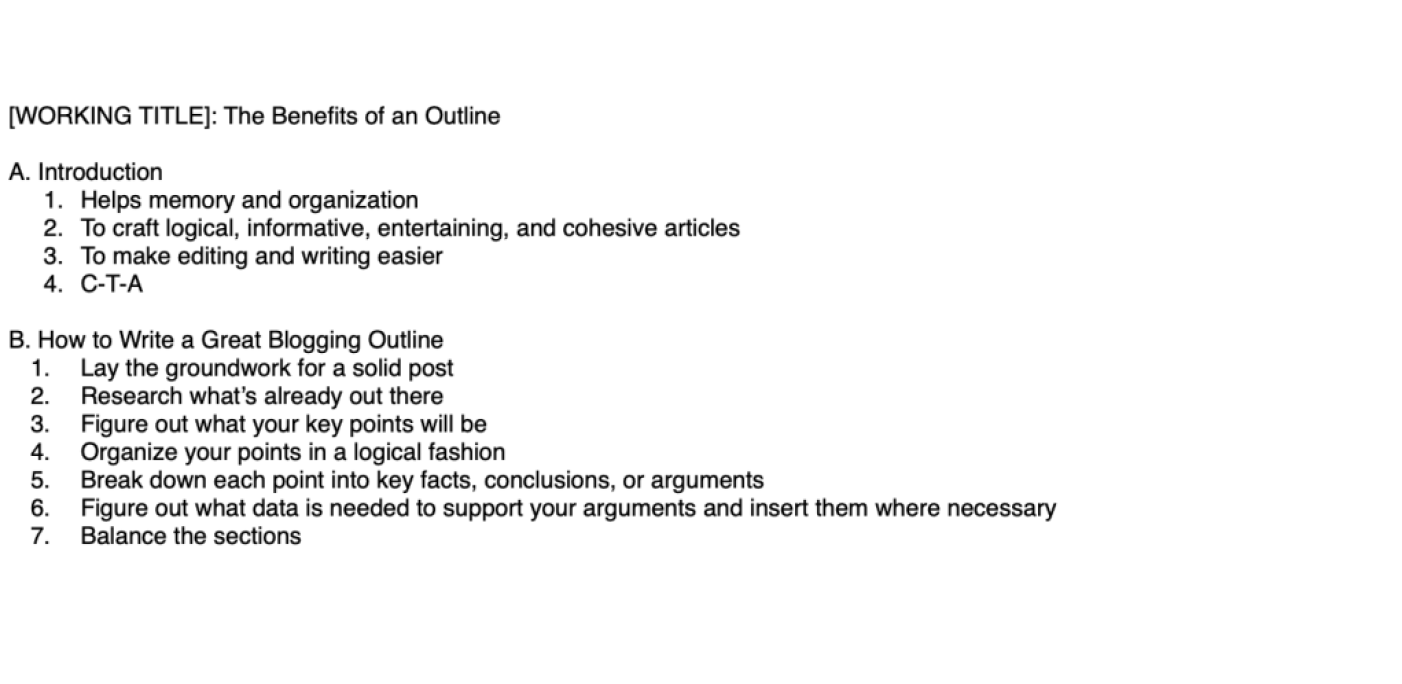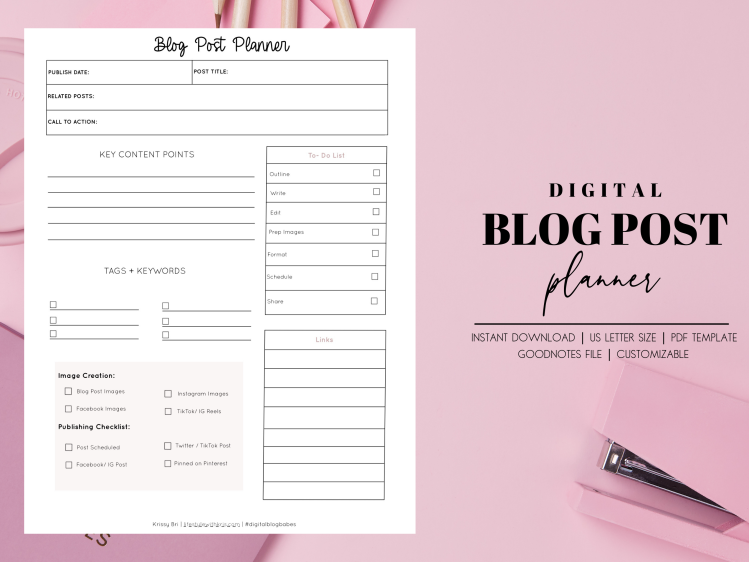Your cart is currently empty!
March 2022
-
How To Outline A Blog Post in 15 Minutes

How long does it take you to write a blog post? This question is one I see bloggers ask each other all of the time. I’ve even googled it out of desperation and curiosity to figure out the answer. It takes a blogger approximately 2-3 hours to write a quality blog post. I started comparing my writing performance to the responses of other bloggers. How to outline a blog post efficiently? Is two hours enough time to brainstorm a blog topic, gather thoughts, and still have enough time to write it?
There are many ways to outline a blog post!
Some bloggers do not take as much time as others to write their blogs. Don’t worry. The last thing you should do is compare yourself to another blogger’s writing schedule. The best advice for figuring out your writing schedule is to create a consistent timetable that works for you.
I would not recommend adopting another bloggers’ writing schedule, but I would recommend learning the strategies that helped them develop the blogging schedule that works for them. This blog post highlights one of the best tools bloggers use to publish quality blog posts — blog outlines.
Blog outlines are simple tools for bloggers to draft, write and organize their ideas for a blog post before publishing.
this guide will cover:
- how to spend less time planning out a blog post
- what to outline for your blog post
- examples of blog outlines
- how to outline your next blog post in 15 mins
How To Spend Less Time Planning Out A Blog Post
If you are spending more than the average amount of time it would take to write a blog post, you are most likely doing this:
- struggling with coming up with topics
- researching while you write
- not passionate about the topic you chose to write about
One thing that will help cut out much of the time you spend writing is to start drafting your blog posts in advance. Developing a blueprint for your blog posts gives you more ideas for what you will be discussing in your post. It can not be easy to juggle all our ideas for one topic & without drafting or jotting them down, we will forget them. Start sketching your blog posts & researching topics thoroughly before committing to writing the post.
Need help brainstorming topics you should write about? Check out this list of 350+ blog topic ideas for any niche!

How To Outline For Your Blog Post
Are you looking for ideas for what to write on your blog post outline? First— you will need a topic. The topic you chose needs to be something you can talk about comfortably and freely. Next, you will need:
- Key subheading content points
- Supporting statements for that subheading
- Affiliate links for any suggestions for readers
- List of keywords and tags for search engine optimization
You can even take it a step further and create a checklist/to-do list for each step in your writing process. To-do lists and checklists for your blog post will help you remember to edit, format, schedule, publish, create pictures, etc. Here is an example of what a blog post outline should look like:

example of a blog post outline A Simple Blog Post Outline
Ready to start outlining your next blog post? I have the perfect blog post template for bloggers planning out their blog posts. I created this template to help with organizing and writing ideas for quality blog posts. The Blog Post Template is a digital pdf that you can download and save to any digital planner or notetaking application. This digital template is designed to help bloggers brainstorm post titles, publish dates, related posts, call-to-action, and key content points. The digital blog post template has checklists and to-do lists to keep bloggers on track with outlining, writing, editing, formatting, and scheduling their blog posts. The template also includes space for tracking tags, links, and keywords.
Click the jump to get your blog post template and start planning your writing content today.

Never have to worry about writing quality blog posts again! To keep your readers engaged, your blog posts have to be cohesive, entertaining, informative, and easy to read. It’s easy to write and have all your thoughts jumbled at once while you’re trying to remember to get all of your ideas out!
Use this Blog Post Planner template to avoid never having to worry about jumbled thoughts, incohesive paragraphs, and sloppy structures ever again! This Blog Post Planner template was designed to help bloggers and writers get their key points across, create blog outlines before writing, and checklists for blogging tasks.
Bloggers should be using outlines when preparing to write quality blog posts. Using an outline before you write helps you create thought-flowing, entertaining posts & cuts down on how much time you would usually spend writing your blog posts. You can easily create an outline for your next blog post in 15 minutes! Outlines are another tool to help you stay consistent with blogging & they will also help with coming up with ideas for additional blog post topics!
Was this helpful? Leave me a comment below.
-
What Is Seo And Why Is Seo Important For My Website?

Search Engine Optimization is a vital digital marketing tool.
Picture this. You own, manage, and run your own website. Your website is filled with entertaining, informative, and valuable content, but no one is reading it. You’re stressed because you’ve spent so much time, energy, and money invested in your website. However, it’s not thriving due to low or no traffic. You want to know how to increase your website traffic because you are passionate about seeing your business succeed. You landed here because you discovered SEO during your research, and you have no clue how to increase your traffic. You’re also not sure if you really understand how SEO works and how important it is.
SEO consists of many elements. Knowing what they are and how they work is key to understanding why SEO is so important.
Search engine optimization is crucial for your website because it helps make it more visible. This then equates to more traffic, builds brand awareness, and positions you as a trustworthy expert in your niche.
This post discusses the importance of SEO for your website and how to use SEO to rank on search engines. You will have a better understanding of how SEO works and a step closer to increasing traffic to your website.
Quality Content is what Search Engines Look For
Content is the most vital part of Search Engine Optimization. It is what the people will see first when they visit your website. The content you create is what you use to reach and engage with your target audience. You most likely know by now that you should be creating and posting content that readers will find valuable. Quality content varies in many forms for many website creators (blogs, videos, podcasts, e-books) and needs to be shared consistently to rank on search engines. A lot of content = a lot of chances to increase your website’s online visibility.
For example, website pages and posts should have a minimum of 500 words for search engines to crawl the content on your pages. Even then, depending on which SEO expert you’d ask, they would say 500 is considered to be generously low and should really be around 700-800 minimum words. Valuable content is just one key element to increasing traffic with SEO.
Keywords Will Help Search Engines Find Your Content
Your content will also need to feature some keywords to rank higher on search engines. Keywords are words and phrases that consumers use to find what they are looking for online; and that brands can then use to connect with prospects looking for their products and services.
Finding out what keywords you’ll need for search engine optimization is not a simple task. A general rule of thumb is to look for keywords with high search rates (but low competition). Choose short-tail keywords (such as kid), long-tail keywords (such as adolescent children’s books for sale), and local keywords (such as children’s books for sale in Biloxi) to work into your content. Use keywords to optimize your titles, URLs, and the usability of your website. All this work you are doing to optimize your on-page SEO content will be crucial to improving the visibility and traffic of your website.
You Can Create SEO Opportunities Off-Page
Off-page SEO refers to actions taken outside of your own website to impact your rankings within search engine results pages (SERPs). Backlink building is a popular tool for establishing off-page search engine optimization. There are many tactics for backlink building. Some of the current best practices include guest blogging, advertising, creating a lot of high-quality content to be shared, and using influencer marketing in your content. You will need to network to start building backlinks to your website. Networking and backlinks are great ways for your target audience to find out about who you are and what you do. Take advantage of collaboration opportunities!
Search Engines Love Websites With Quick Load Times
A responsive and speedy website will make a user-friendly experience for all your mobile and desktop visitors. By increasing the load speed of your website, readers will be able to browse longer, decreasing your website bounce rate. You should find out what your website’s load speed is before you decide to make any changes for search engine optimization. If it ain’t broke, do not fix it!
Word of advice for pages with low load speeds: if your load speed is low, take steps to improve your speed by optimizing high-resolution images, fixing JavaScript issues and excessive HTTP Requests, and bad hosting.
Think about it: you have spent a lot of time putting content on your website. It would be a disappointment if your audience cannot access (or gives up waiting to access) the content because the website/page does not load.
Some things to remember about SEO:
- SEO does not happen overnight
- search engines are not perfect
- You do not have to be an expert to optimize your website content
I recommend researching and using SEO tools to continue learning how to use search engines to increase website traffic and brand awareness. Websites like Moz and Semrush have been extremely helpful for me and my journey to understanding SEO. There are plenty of SEO courses and e-books to help you create a consistent SEO strategy plan for optimizing your content, increasing traffic, and reaching your target audience.
I have been working to understand how SEO works for years, and each time I learn something new about how important it is to rank (and rank higher) on search engines. The more elements of SEO we incorporate into our growth strategies, the more opportunities for increasing brand awareness, visibility, and site traffic.
What do you think about SEO and its importance to organic website traffic? How will you use SEO to help grow your website? What else do you think is important to know about SEO and search engines? What advice would you give someone who wants to rank higher on search engines and increase website traffic?
Leave me a comment below.
